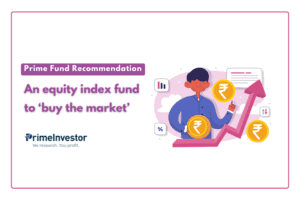
Prime Review: New theme on the block – innovation funds
A close look at an emerging theme with several recent launches under the banner ‘Innovation funds’!

Bhavana was Deputy head of research at FundsIndia and was instrumental in converting many of the research outputs to products on the platform. She is a management graduate in finance with over 11 years of experience. 4 years were at FundsIndia, 7 years with The Hindu Business Line as research analyst.
Bhavana is an expert at analyzing stocks, sectors, and funds and creating portfolio products for investors. She is adept at providing structure and process to any research work and ensures a transparent and clear methodology to analysing products in an unbiased manner.
Bhavana’s ability to simplify complex analysis into simple, well-written, actionable commentaries has won the praise of many investors.
Bhavana is a management graduate from BIM.


A close look at an emerging theme with several recent launches under the banner ‘Innovation funds’!

This index fund lets you buy into the Indian market and make the most of the correction!

A stable consumer play to ride through an environment of moderating earnings growth.
All you need to know about Multi Asset Allocation funds in this deep dive!

Fund recommendations to play 3 themes that make for timely investments today and yet don’t bring the high valuation risk that comes with overheated themes.

Your one stop to wrapping your head around hybrid funds.
Legal Disclaimer : PrimeInvestor Financial Research Pvt Ltd (with brand name PrimeInvestor) is an independent research entity offering research services on personal finance products to customers. We are a SEBI registered Research Analyst (Registration: INH200008653). The content and reports generated by the entity does not constitute or is not intended to constitute an offer to buy or sell, or a solicitation to an offer to buy or sell financial products, units or securities. All content and information are provided on an ‘as is’ basis by PrimeInvestor Financial Research Pvt Ltd. Information herein is believed to be reliable but PrimeInvestor Financial Research Pvt Ltd does not warrant its completeness or accuracy and expressly disclaims all warranties and conditions of any kind, whether express or implied. The services rendered by PrimeInvestor Financial Research Pvt Ltd are on a best-effort basis. PrimeInvestor Financial Research Pvt Ltd does not assure or guarantee the user any minimum or fixed returns. PrimeInvestor Financial Research Pvt Ltd or any of its officers, directors, partners, employees, agents, subsidiaries, affiliates or business associates will not liable for any losses, cost of damage incurred consequent upon relying on investment information, research opinions or advice or any other material/information whatsoever on the web site, reports, mails or notifications issued by PrimeInvestor Financial Research Pvt Ltd or any other agency appointed/authorised by PrimeInvestor Financial Research Pvt Ltd. Use of the above-said information is at the user’s own risk. The user must make his own investment decisions based on his specific investment objective and financial position and using such independent advisors as he believes necessary. All intellectual property rights emerging from this website, blog, and investment solutions are and shall remain with PrimeInvestor Financial Research Pvt Ltd. All material made available is meant for the user’s personal use and such user shall not resell, copy, or redistribute the newsletter or any part of it, or use it for any commercial purpose. PrimeInvestor Financial Research Pvt Ltd, or any of its officers, directors, employees, or subsidiaries have not received any compensation/ benefits whether monetary or in kind, from the AMC, company, government, bank or any other product manufacturer or third party, whose products are the subject of its research or investment information. The performance data quoted represents past performance and does not guarantee future results. Investing in financial products involves risk. Investments are subject to market risk. Please read all related documents carefully. As a condition to accessing the content and website of PrimeInvestor Financial Research Pvt Ltd, you agree to our Terms and Conditions of Use, available here. This service is not directed for access or use by anyone in a country, especially the USA, Canada or the European Union countries, where such use or access is unlawful or which may subject PrimeInvestor Financial Research Pvt Ltd or its affiliates to any registration or licensing requirement.
The purpose of these disclosures is to provide essential information about the Research Services in a manner to assist and enable the prospective client/client in making an informed decision for engaging in Research services before onboarding. History, Present business and Background: PrimeInvestor Financial Research Private Limited is registered with SEBI as Research Analyst with registration no. INH200008653. The Research Analyst got its registration on August 19, 2021 and is engaged in offering research and recommendation services. Terms and conditions of Research Services: The Research Services will be limited to providing independent research recommendation and shall not be involved in any advisory or portfolio allocation services. The Research Analyst never guarantees the returns on the recommendation provided. Investor shall take note that Investment/trading in stocks/Index or other securities is always subject to market risk. Past performance is never a guarantee of same future results. The Research Analyst shall not be responsible for any loss to the Investors. Disciplinary history: There are no pending material litigations or legal proceedings against the Research Analyst. As on date, no penalties / directions have been issued by SEBI under the SEBI Act or Regulations made there under against the Research Analyst relating to Research Analyst services. Details of its associates: No associates. Disclosures with respect to Research and Recommendations Services: The Research Analyst or its directors or any of its officer/employee does not trade in securities which are subject matter of recommendation. There are no actual or potential conflicts of interest arising from any connection to or association with any issuer of products/ securities, including any material information or facts that might compromise its objectivity or independence in the carrying on of Research Analyst services. Such conflict of interest shall be disclosed to the client as and when they arise. Research Analyst or its directors or its employee or its associates have not received any compensation from the company which is subject matter of recommendation. Research Analyst or its directors or its employee or its associates have not managed or co-managed the public offering of any company. Research Analyst or its directors or its employee or its associates have not received any compensation for investment banking or merchant banking of brokerage services from the subject company. Research Analyst or its directors or its employee or its associates have not received any compensation for products or services other than above from the subject company. Research Analyst or its directors or its employee or its associates have not received any compensation or other benefits from the Subject Company or 3rd party in connection with the research report/ recommendation. The subject company was not a client of Research Analyst or its directors or its employee or its associates during twelve months preceding the date of recommendation services provided. Research Analysts or its directors or its employee or its associates has not served as an officer, director or employee of the subject company. Research Analysts has not been engaged in market making activity of the subject company.
Full disclosures and disclaimers
Other disclosures and disclaimers
Investment in securities market are subject to market risks. Read all the related documents carefully before investing.
Compliance Officer Details: Name: Bhavana Acharya; Email: contact@primeinvestor.
Grievance Officer Details: Name: Srikanth Meenakshi; Email: contact@primeinvestor.
Hold On
You are being redirected to another page,